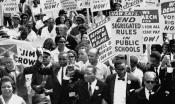text
Informational
Veteran Benefits Denied Holders
An article in a Black newspaper that describes how thousands of Black soldiers and others from marginalized groups, including LGBTQ people, were denied GI benefits after returning from World War II
July 7, 2022

